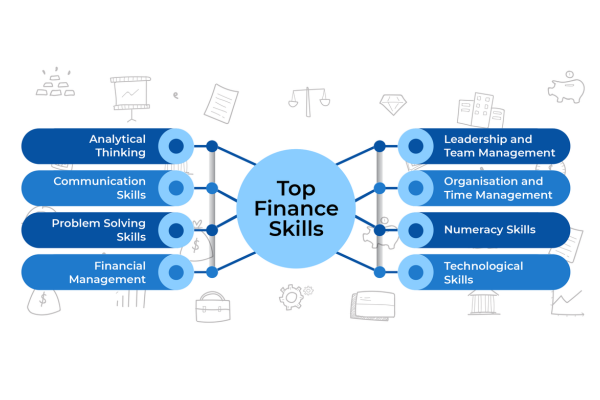Essential Skills for Financial Professionals in Today’s Market
04 February 2025
6 Mins Read

toc impalement
Today’s financial landscape is more dynamic than ever! This requires users and service providers to up their game and embrace relevant technology. Professionals in this sector must stay up to date with the trends to ensure relevance and compliance. So, knowing the skills for financial professionals can help them thrive in the sector.
This is necessary for complete (and ethical) integration of advanced technologies that help evolve with the regulatory frameworks. Having the right set of skills also helps the professional adapt to the shifting market dynamics.
To help you stay continuously competent, we’re here with an article on skills that can help you stay relevant. Read through to learn the essential skills that redefine financial professionals and help them thrive in a dynamic market.
10 Essential Skills for Financial Professionals

Being relevant in your sector takes a lot more than knowing the right opportunities – you need the right set of skills. That is why it is so important to constantly keep evolving your skills – no matter the sector you are in.
Here’s a list of all the essential skills for financial professionals:
Technological Proficiency in Financial Tools
The rapid technological advancements have been transformative for the finance sector. It is amazing how professionals now must have the proficiency to run financial software and tools. Why? Because technological advancements in the sector help improve efficiency and accuracy. Two things that the finance sector is always trying to improve.
With the help of technological integration, you’ll get hands-on experience with enterprise resource planning (ERP) systems, advanced analytics platforms, and data visualization tools. These are some of the necessary tools that are useful in the current times.
In addition, comprehending emerging technologies such as blockchain and artificial intelligence will give you an edge against the competition. The technological trends that present themselves are important due to the professional growth that comes with it.
With the rise in technological trends, you can leverage these tools to optimize performance and deliver exceptional value.
Advanced Financial Analysis and Business Strategy
As a professional in this sector, it is important that you have strong analytical skills. These are some of the most essential skills for financial professionals. However, the scope expands beyond traditional methods and brings innovation in this sector.
The ability to interpret vast data, while applying insights to the strategy is a need of the hour. Especially ever since there is a dynamic integration of technology. Consequently, companies expect professionals to move beyond smashing their targets and use their financial analysis to guide business decisions.
An online MBA in accounting can help you develop fundamental financial expertise, while also helping them hone strategic thinking. The educational path is important to strengthen the knowledge in managerial accounting, financial reporting and corporate finance. These are essential for effective decision-making.
In addition, professionals with a deeper understanding of such principles can contribute to risk mitigation strategies and profitability. This makes them a valuable asset in any financial role.
Strategic Thinking for Business Acumen
A financial professional does not just thrive with technical skills, strategic thinking helps them utilize their knowledge to a situation. This is also essential for the professional to understand the business environment, analyse the market trends and factors to influence financial decisions.
Professionals should have a broader perspective to assess the strategies and anticipate market shifts, this can help them develop long-term plans. This helps support organizational objectives, too.
In addition, strategic thinking as skills for financial professionals is essential for them to align their financial initiatives with the overall business goals. It also helps facilitate informed decision-making, thereby fostering sustainable growth.
Regulatory Knowledge and Risk Management

It is necessary that you navigate the complex regulatory landscape skillfully – this is one of the most critical skills for financial professionals. This comes from a thorough understanding of the regulations and laws as applicable for the sector. For example, International Financial Reporting Standards (IFRS) are essential across most countries.
As a financial professional, you must ensure your company or business is adhering and complying with the relevant regulations. This helps prevent legal risks and upholds organizational integrity. In addition, effective risk management strategies include identifying, assessing and implementing strategies to fight potential financial risks.
This is an essential approach that safeguards organizations against unforeseen circumstances and builds resilience.
Effective Interpersonal and Communication Skills
As a professional across sectors, it is important that you have effective communication skills. As a financial professional, it is even more crucial due to the client-facing models that are prevalent here. Thus, communication skills for financial professionals become quite important due to the need for clearly communicating complex information.
This skill becomes quite important due to the high volume of interaction between stakeholders and professionals who may not always have a financial background. Therefore, having interpersonal as well as communication skills are essential for translating intricate data into easy-to-understand insights.
It also enables them to work efficiently, especially within a team – this is essential for building relationships, too. As a manager or a senior professional in your company, you must have the ability to convey information in a persuasive manner. This influences decision-making and drives organizational success.
Adaptability and Continuous Learning
the financial sector rapidly changes, probably the most in comparison to other sectors. These technological advancements are a result of the evolving market conditions. Thus, professionals must exhibit adaptability through embracing the new methodologies such as adjusting to the dynamic environments.
In addition, this shows a commitment to continuous learning which is essential for staying on-trend with the developments. In addition, you can attend workshops, pursue certifications and engage in lifelong learning – thus, staying relevant and equipped with the latest knowledge.
Ethical Judgment and Integrity
Upholding ethical standards is fundamental in finance. Professionals are entrusted with sensitive information and significant responsibilities. Demonstrating integrity involves making decisions that are not only legally compliant but also morally sound.
Ethical judgment fosters trust with clients, colleagues, and stakeholders, which is crucial for long-term success. Maintaining transparency and accountability reinforces the credibility of both the professional and the organization.
Global Perspective and Cultural Awareness
In an increasingly globalized market, financial professionals benefit from a broad perspective that encompasses diverse economic environments and cultural contexts. Understanding international markets, exchange rates, and global economic indicators enables professionals to make informed decisions in a global context.
Cultural awareness also enhances communication and negotiation with international clients and partners, facilitating successful cross-border collaborations.
Leadership and Team Management
As professionals advance in their careers, leadership skills become increasingly important. Effective team management involves guiding and motivating team members, delegating tasks appropriately, and fostering a collaborative work environment.
Strong leaders also mentor junior professionals, contributing to their development and the overall talent growth within the organization. Leadership in finance requires decisiveness, empathy, and the ability to inspire others toward achieving common goals.
Financial Planning and Resource Management
Expertise in financial planning is crucial for developing budgets, forecasting financial performance, and managing resources efficiently. Professionals must be adept at creating comprehensive financial plans that align with strategic objectives.
This includes analyzing financial data to project future revenues and expenses, identifying areas for cost savings, and ensuring optimal allocation of resources. Effective financial planning supports organizational stability and facilitates informed decision-making.
Skills Will Set You Apart!
All in all, today’s financial landscape demands the presence of these skills in financial professionals. By cultivating these essential competencies, financial professionals can navigate the complexities of the market, drive strategic initiatives, and contribute significantly to their organizations’ success.
Continuous development in these areas will keep professionals competitive and effective in the dynamic world of finance.


















Comments Are Closed For This Article